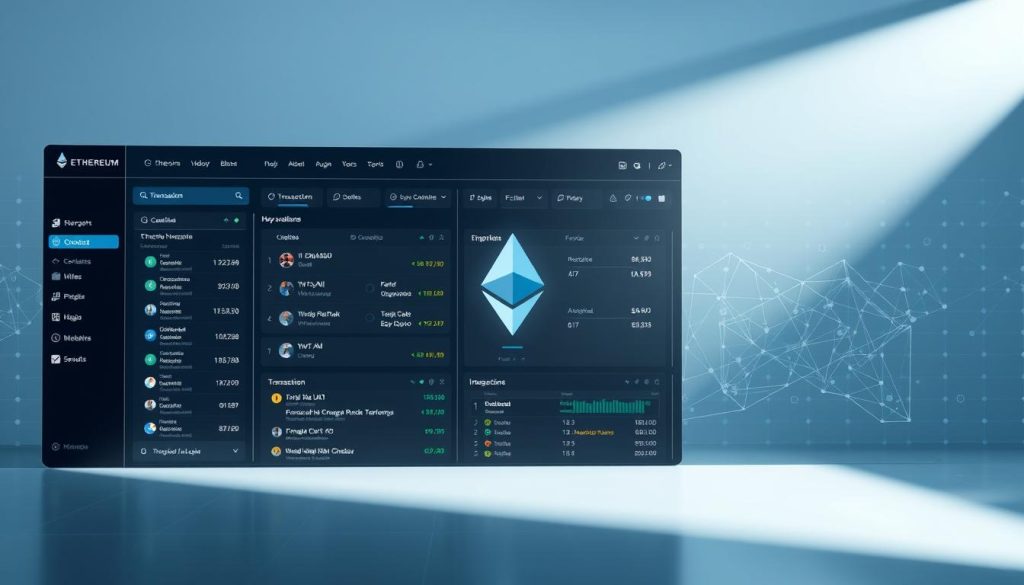The global quantum computing market skyrocketed from $1.3 billion to over $5 billion in three years. This staggering 400% growth has transformed an emerging tech sector. It’s a shift that demands attention from savvy investors.
Since 2019, quantum technology has evolved from sci-fi to reality. The investment landscape has completely transformed. Major corporations and innovative startups now race to dominate this field.
Years of analyzing financials, patents, and market trends have revealed promising opportunities. This isn’t about hype. It’s about finding companies making real progress in quantum development.
I’ll share my evaluation metrics and red flags for quantum investments. You’ll learn why this sector offers both huge potential and significant risk. Consider this your guide to identifying the most promising quantum companies.
Key Takeaways
- Quantum computing market has grown nearly 400% in three years, creating new investment opportunities
- Focus on companies with actual quantum progress, not just marketing promises
- Patent portfolios and research partnerships indicate serious quantum development efforts
- Financial metrics matter more than hype when evaluating quantum technology investments
- This sector carries high risk but offers potential for significant returns
- Diversification across multiple quantum approaches reduces investment risk
Understanding Quantum Computing and Its Market Potential
Quantum technology is reshaping processing power and creating new investment opportunities. Major corporations are betting billions on this field. The quantum computing landscape offers unique market dynamics unlike traditional tech sectors.
Understanding the fundamentals is crucial for making informed investment decisions. The market dynamics here differ greatly from traditional tech sectors.
What is Quantum Computing?
Traditional computers use bits that exist as either 0 or 1. Quantum computers use qubits that can exist in multiple states simultaneously.
This isn’t just theory anymore. Real quantum systems are solving specific problems faster than any supercomputer we’ve built. IBM’s quantum processors tackle optimization problems that would take classical computers years to solve.
Practical applications drive the investment thesis for quantum computing stocks. Financial modeling, drug discovery, and cryptography are just the beginning. Companies like D-Wave and Rigetti are already delivering quantum solutions to paying customers.
“Quantum computing will be the next major computing paradigm, with the potential to solve problems that are intractable for classical computers.”
The key difference lies in processing capability. Classical computers handle calculations sequentially, while quantum systems process multiple possibilities simultaneously. This creates exponential advantages for specific problem types.
The Growth of the Quantum Computing Market
Market projections show growth from $1.3 billion in 2024 to potentially $5.3 billion by 2029. Actual spending patterns tell a compelling story.
Government investments are accelerating rapidly. The U.S. National Quantum Initiative allocated over $1.2 billion for quantum research. China announced $15 billion in quantum technology investments.
| Market Segment | 2024 Value | 2029 Projection | Growth Rate |
|---|---|---|---|
| Hardware | $0.8 billion | $3.2 billion | 32% CAGR |
| Software | $0.3 billion | $1.4 billion | 36% CAGR |
| Services | $0.2 billion | $0.7 billion | 28% CAGR |
Corporate spending patterns reveal where smart money is flowing. Companies are increasing their quantum research budgets by 40-60% annually. This often correlates with quantum computing stocks to buy.
The timeline for commercial viability keeps accelerating. What experts predicted for 2030 is happening in 2024. This creates investment opportunities that weren’t visible even two years ago.
Key Players in the Quantum Industry
The competitive landscape has three distinct categories. Each offers different risk-reward profiles for investors. These categories shape approaches to quantum computing stocks to buy.
Established tech giants dominate the first tier. IBM leads with their quantum network of over 200 systems. Google achieved quantum supremacy with their Sycamore processor.
Pure-play quantum companies represent the second tier. Rigetti Computing trades publicly and focuses on quantum cloud services. IonQ specializes in trapped-ion quantum computers.
- Hardware manufacturers: IBM, Google, Rigetti
- Software developers: Microsoft, Xanadu, Cambridge Quantum Computing
- Component suppliers: Applied Materials, Lam Research
- Cloud providers: Amazon (Braket), IBM (Quantum Network)
The third tier includes quantum enablers—companies building the infrastructure that quantum systems require. Cryogenic equipment manufacturers and specialized chip fabricators are seeing increased demand.
Partnership networks are becoming crucial indicators. IBM’s quantum partners include over 140 academic institutions and corporations. These partnerships often signal future revenue streams.
Supply chain considerations are increasingly important. Quantum systems require exotic materials and precision manufacturing. Companies controlling these supply chains may offer indirect but stable exposure to quantum growth.
The competitive dynamics shift rapidly in this space. Patent portfolios and research publications often predict future market leaders better than current revenue figures. This makes fundamental analysis challenging but potentially rewarding for patient investors.
Top Quantum Stocks to Consider
I’ve identified three standout companies in quantum technology after years of tracking developments. Each offers a unique approach to commercializing quantum tech. These top quantum technology companies have caught my attention for distinct reasons.
The quantum computing space is filled with promises and prototypes. My analysis focuses on companies with real progress, not just theoretical breakthroughs. Only a few have moved beyond research into actual revenue generation.
IBM: A Leader in Quantum Research
IBM stands out as my most consistent pick among quantum stocks. They’re commercializing quantum technology right now. Their quantum network includes over 200 members, from Fortune 500 companies to academic institutions.
IBM already earns money from quantum cloud services through their Quantum Experience platform. I’ve tracked their evolution from their first 5-qubit processor to their current 1000+ qubit systems.
The company represents the stability play in quantum computing investment. They have established partnerships, proven technology, and a clear path to scaling production.
Google’s Quantum Program
Google’s quantum approach fascinates me because of their breakthrough achievements. They claimed “quantum supremacy” in 2019 with their Sycamore processor. This milestone proved quantum computers could solve problems faster than classical computers.
However, their commercial strategy remains unclear to me. Google focuses more on breakthrough research than immediate monetization. This makes them a moonshot investment rather than a steady revenue generator.
Their parent company Alphabet provides financial stability for long-term quantum research. But investors need patience with Google’s quantum timeline.
Rigetti Computing: A Rising Star
Rigetti represents the pure-play quantum opportunity in my portfolio. They’re a smaller company focused entirely on quantum computing development. This concentration brings both higher risk and potentially higher rewards.
I’ve watched them navigate public markets and secure partnerships with government agencies. Their hybrid quantum-classical computing approach sets them apart from larger competitors. They’re building quantum processors and the software to run them.
Rigetti offers concentrated quantum exposure that you can’t find in tech giants like IBM or Google. Their success depends entirely on quantum technology adoption.
| Company | Investment Thesis | Revenue Status | Risk Level |
|---|---|---|---|
| IBM | Stability and current revenue | Active quantum cloud services | Low to Medium |
| Google (Alphabet) | Breakthrough research potential | No direct quantum revenue | Medium |
| Rigetti Computing | Pure-play quantum exposure | Limited commercial revenue | High |
Each company represents a different investment philosophy. IBM offers immediate exposure to quantum revenue. Google provides access to cutting-edge research with financial backing. Rigetti delivers concentrated quantum computing investment for risk-tolerant investors.
Metrics to Evaluate Quantum Stocks
Traditional valuation methods don’t work for quantum stocks. I learned this through experience investing in quantum computing companies. Standard ratios fail to show a quantum company’s true potential.
I’ve created a special framework for these unique investments. The quantum sector differs from traditional tech companies. Most quantum firms are in pre-revenue stages or have minimal quantum-specific income.
This requires a different analytical approach. Look beyond basic financial metrics. Focus on factors that predict success in this new field.
Market Capitalization and Financial Health
Market cap matters, but not how you might think. Some investors get excited about big valuations without understanding quantum company value.
Quantum revenue as a percentage of total revenue is more important than overall market capitalization. IBM’s quantum division is tiny compared to their total business. Rigetti, however, focuses mainly on quantum technologies.
Cash runway is crucial for quantum companies. They need 18-24 months of operating expenses in reserves. This helps them handle setbacks and market changes.
Debt levels need careful review. Quantum firms can’t easily cut costs during tough times. Their research commitments are fixed, making high debt risky.
Research and Development Spending
R&D spending shows a quantum company’s commitment and progress. Look for companies spending at least 15-20% of revenue on quantum research. But raw numbers can be misleading.
Patent filings are more telling than press releases. Track applications in quantum computing, networking, and sensing. Companies filing 10+ patents yearly show serious research momentum.
Research publications are important too. Company scientists publishing in top journals signal real scientific progress. I track publications from key personnel at quantum companies.
Quality research partnerships indicate R&D effectiveness. Working with top universities or national labs suggests access to cutting-edge research and talent.
Partnerships and Collaborations
Partnerships show market validation better than marketing. Real-world applications come from strategic collaborations, not isolated development.
Government contracts are very important. Agencies fund solutions, not experiments. Quantum companies with defense contracts show sustainable revenue potential.
Corporate partnerships indicate commercial viability. BMW using quantum for supply chain or banks exploring quantum risk modeling shows real demand. These often lead to pilot programs and full implementations.
| Partnership Type | Market Signal | Revenue Potential | Risk Level |
|---|---|---|---|
| Government Defense | High validation | Stable long-term | Low |
| Corporate Pilots | Commercial interest | Variable scaling | Medium |
| Academic Research | Technical credibility | Limited direct | High |
| Cloud Platforms | Market access | Usage-based growth | Medium |
The exclusivity and duration of partnerships are key. Multi-year exclusive agreements with major corporations are more valuable than brief research collaborations. These often include milestone payments and revenue sharing.
Geographic diversity in partnerships is important. Companies with global partnerships show wider appeal. They also reduce dependence on single regions or industries.
Graphical Overview: Quantum Computing Growth Predictions
Quantum computing growth predictions reveal a complex story of opportunity and reality. The numbers look impressive, but they require deeper analysis. My experience has taught me to look beyond the surface of these projections.
Research firms predict compound annual growth rates between 25-35% through 2030. These figures combine hardware, software, and services in potentially misleading ways. The reality is more nuanced than these headline numbers suggest.
Market Value Projections
Forecasts show quantum computing reaching $65 billion to $95 billion by 2030. This wide range highlights the uncertainty involved. The most realistic projections are closer to the lower end of this spectrum.
Quantum software and services are expected to grow faster than hardware. This makes sense, as hardware breakthroughs often take longer to commercialize.
Here’s what the data shows for projected market segments:
| Market Segment | 2024 Value (Billions) | 2030 Projection (Billions) | Expected CAGR |
|---|---|---|---|
| Quantum Hardware | $2.1 | $12.8 | 32% |
| Quantum Software | $1.8 | $18.4 | 42% |
| Quantum Services | $1.3 | $15.2 | 45% |
| Cloud Access | $0.9 | $8.7 | 38% |
Software and services categories show the highest growth potential. Companies focusing on quantum algorithms and cloud-based services are attracting more investor attention. This aligns with market observations.
Investment Trends Over the Last Decade
Venture capital funding peaked in 2021 at around $2.4 billion. It then pulled back as investors became more selective. This cooling-off period created better opportunities for serious investors.
There’s a shift from pure research investments to companies with near-term commercial applications. Investors now want to see clearer paths to profitability.
Here’s what the investment landscape looks like:
- 2019-2020: Heavy focus on hardware development and basic research
- 2021: Peak funding year with $2.4 billion in VC investments
- 2022-2023: More selective investing, emphasis on commercial viability
- 2024: Growing interest in quantum software and hybrid solutions
The quantum computing ETFs situation remains limited, surprising many investors. No dedicated quantum computing ETF is available yet. Several technology-focused ETFs include quantum exposure, representing both a challenge and an opportunity.
Some broader technology ETFs include quantum-related holdings. These provide indirect exposure rather than pure quantum computing investment opportunities. This gap in the market is noteworthy.
Early-stage quantum companies might not generate significant returns for 5-10 years. Established players with quantum divisions offer more immediate upside potential. This reality check has helped adjust investment approaches.
Venture capital data shows interesting geographic patterns. U.S. companies received about 60% of global quantum investment. Significant funding also flowed to Canadian and European startups. This distribution suggests a truly global quantum race.
Understanding these trend patterns is crucial for investors considering quantum computing ETFs or stocks. The market is still developing. Investment opportunities will likely evolve significantly over the next few years.
Statistical Analysis of Quantum Stocks Performance
Quantum computing stocks show unique market behavior since 2020. The data reveals patterns that challenge traditional tech investing norms. These stocks don’t follow typical earnings cycles like other tech companies.
Quantum stocks experience extreme volatility. Daily swings often exceed the S&P 500’s annual volatility of 15-20%. This level of fluctuation is rare in other sectors.
Historical Stock Performance
Pure-play quantum companies have shown dramatic price movements. IonQ’s stock price journey illustrates this volatility perfectly. It started at $10, soared to $30, then plummeted to single digits.
Rigetti Computing followed a similar pattern with 200%+ swings in both directions. These massive moves happened within weeks or days. Different technological approaches create opportunities and confusion for investors.
IBM and Google’s quantum-related movements are more stable. Their quantum progress contributes to overall performance but doesn’t cause dramatic swings. This stability is due to quantum being just one part of their operations.
Comparisons with Traditional Tech Stocks
Quantum stocks behave more like biotech companies than traditional tech stocks. They react to research milestones and partnership announcements rather than earnings reports. A single research paper can trigger 20-30% overnight moves.
Traditional tech stocks follow predictable patterns around earnings and product launches. Quantum stocks, however, march to a different beat. They align with quantum computing news, government funding, and breakthrough research publications.
The data shows fascinating differences between technological approaches. Companies focusing on various qubit types show distinct trading patterns. These patterns reflect their research progress and commercial timelines.
| Company | Technology Focus | 2023 Volatility | Peak-to-Trough Range |
|---|---|---|---|
| IonQ | Trapped Ion | 85% | $6.50 – $31.00 |
| Rigetti | Superconducting | 92% | $0.80 – $4.20 |
| D-Wave | Quantum Annealing | 78% | $0.65 – $2.15 |
| IBM (Quantum Division Impact) | Superconducting | 25% | $120 – $165 |
Quantum investing requires a unique approach. It demands constant attention to research and industry news. The leading quantum computer manufacturers shape this volatile but potentially rewarding market segment.
Predictions for the Future of Quantum Stocks
Quantum computing stocks offer a mix of uncertainty and potential for long-term investors. Forecasts range from conservative to wildly optimistic. These projections could reshape entire industries.
Expert predictions vary widely. Some say quantum advantage is 5-10 years away. Others believe breakthrough applications will emerge much sooner.
Expert Forecasts on Market Growth
McKinsey predicts quantum computing could create $850 billion in annual value by 2040. Specific application forecasts are more convincing than broad market size estimates.
Three key areas show promise. Drug discovery and molecular simulation could see quantum advantages within a decade. Financial modeling and risk analysis offer near-term opportunities for practical quantum applications.
Quantum software startups are building the stack for quantum hardware. This software layer might offer diverse investment opportunities with lower capital needs than hardware development.
My prediction: Significant consolidation will occur in the hardware space. Manufacturing costs and technical challenges will eliminate weaker players. Only a few dominant platforms will remain.
Long-term Investment Potential
Investment potential depends on which quantum computing approach scales. Options include superconducting qubits, trapped ions, photonic systems, or undiscovered technologies.
A diversified approach is safer than picking a single technology winner. The quantum ecosystem will likely support multiple technologies. Each will be optimized for different applications.
Here’s how I see the investment landscape evolving over the next decade:
| Time Frame | Technology Focus | Investment Opportunity | Risk Level |
|---|---|---|---|
| 2024-2027 | Quantum software and algorithms | High growth potential | Medium |
| 2027-2032 | Hardware consolidation | Market leaders emerge | High |
| 2032-2040 | Commercial applications | Stable returns | Low to Medium |
Quantum software startups are the most accessible entry point for investors today. They need less capital than hardware makers. They can also pivot quickly as technology evolves.
Expert predictions reveal a key insight: quantum computing won’t replace classical computing entirely. It will complement existing systems for specific, high-value problems.
The total market might be smaller than optimistic projections suggest. However, quantum computing could deliver exponential improvements for certain applications. This potential justifies significant investment premiums.
Tools and Resources for Investors
Quantum stocks require specialized research due to their technical complexity. It’s crucial to distinguish real breakthroughs from marketing hype. My years of experience have taught me this valuable lesson.
Standard financial platforms don’t provide the full picture. To make informed decisions, you need specialized resources in this emerging field.
Stock Analysis Platforms
Yahoo Finance and Bloomberg offer basic financial metrics like market cap and revenue. However, they lack insight into technical developments driving quantum stock prices.
For in-depth analysis, I turn to quantum-specific resources. The Quantum Computing Report breaks down company announcements in detail. It helps determine if a “quantum breakthrough” is significant or just clever marketing.
Government databases reveal companies securing research contracts. SBIR award listings show where federal funding goes. This data often predicts stock movements before they happen.
I also track patent filings through the USPTO database. Companies filing quantum patents today could become tomorrow’s market leaders.
Quantum Computing News and Updates
Academic journals like Nature Quantum Information help track real research progress. These publications reveal actual scientific advances, cutting through corporate spin.
For quantum AI developments, I monitor key sources. IBM’s quantum network updates show their latest partnerships. Google’s AI quantum research publications reveal where they’re pushing boundaries.
Social media provides surprising value in this field. Many quantum researchers share insights on LinkedIn and Twitter. I follow key scientists and executives for early signals.
| Resource Type | Best For | Update Frequency | Cost |
|---|---|---|---|
| Financial Platforms | Basic metrics, stock prices | Real-time | Free to Premium |
| Technical Reports | Company developments | Weekly | Subscription |
| Academic Journals | Research breakthroughs | Monthly | Institutional access |
| Government Databases | Funding announcements | Quarterly | Free |
Startup funding announcements in quantum machine learning often signal new investment opportunities. I track venture capital flows through Crunchbase and industry newsletters.
The challenge is separating signal from noise. Traditional analysts struggle with quantum’s technical complexity. Combining multiple sources gives you the complete picture for smart investment decisions.
Frequently Asked Questions (FAQs)
Investors often ask fascinating questions about quantum investing. These inquiries reveal common misconceptions and core concerns. Let’s address these important issues directly.
We’ll explore three key areas of quantum investing. Each question deserves a thorough answer due to the high stakes involved.
What Makes Quantum Computing Valuable?
Quantum computing solves problems that would take classical computers millennia. It offers exponential speed advantages for specific computational challenges.
Drug discovery is a promising application. Quantum systems can naturally model complex molecular interactions. This ability surpasses classical computers’ capabilities.
Financial institutions are excited about quantum’s potential for risk modeling. Quantum algorithms could reduce day-long simulations to minutes. This advancement would transform how banks assess portfolio risks.
Cryptography applications create another compelling value proposition. Quantum computers will make current encryption methods vulnerable. This threat is driving interest in quantum encryption stocks.
Optimization problems offer immediate commercial applications. Companies like Volkswagen and D-Wave are testing quantum solutions. These applications cover areas like traffic optimization and factory scheduling.
How Do I Start Investing in Quantum Stocks?
Quantum investing requires a different approach than typical tech investing. Start with established companies that have quantum divisions. This strategy is safer than pure-play quantum stocks.
IBM, Google, and Microsoft offer safer entry points. These companies have diversified revenue streams. They won’t collapse if quantum commercialization takes longer than expected.
Here’s my recommended progression for new quantum investors:
| Investment Stage | Risk Level | Company Examples | Allocation Percentage |
|---|---|---|---|
| Conservative Start | Low | IBM, Microsoft, Google | 60-70% |
| Moderate Growth | Medium | Honeywell, Intel | 20-30% |
| Aggressive Speculation | High | Rigetti, IonQ | 5-10% |
| Emerging Sectors | Very High | Quantum encryption stocks | 2-5% |
Research is crucial before investing. Read company reports, understand quantum roadmaps, and track patent filings. The quantum space moves quickly, so stay informed.
Consider quantum-focused ETFs if individual stock picking feels overwhelming. These funds offer diversified exposure. Professional managers handle the complex research for you.
What Are the Risks Involved in Quantum Investments?
Quantum investing risks are substantial and often underestimated. Newcomers can lose significant money if they don’t understand these unique challenges.
Technical risk is a top concern. Quantum computers might not scale as expected due to various problems. Current systems require extreme cooling and isolation, making them expensive and impractical.
Commercial risk is another major factor. Practical applications might take decades longer to develop than projected. The gap between lab demos and commercial viability often surprises investors.
Competitive risk creates uncertainty. Multiple technological approaches compete for dominance. Some will become obsolete, potentially wiping out entire companies overnight.
Regulatory challenges could impact quantum encryption stocks hard. Governments might restrict these technologies for national security reasons. This could limit market opportunities significantly.
Market timing risk affects all quantum investments. The sector experiences extreme volatility based on various announcements. A single negative research paper can crash stock prices across the entire sector.
Valuation risk persists because traditional metrics don’t apply well. Many quantum stocks trade on pure speculation rather than fundamental analysis.
Treat quantum stocks as long-term, high-risk bets. Never invest more than you can afford to lose completely. Maintain realistic expectations about timelines and potential returns.
Conclusion: Making Informed Investments in Quantum Stocks
Quantum investing requires patience and strategic thinking. The sector changes quickly, but patterns have emerged to guide decisions. Successful investing demands a careful approach and thorough research.
Smart Stock Selection Strategy
A tiered approach works best for quantum investing. IBM is a top pick for conservative portfolios. It has an established quantum research division and stable revenue.
Microsoft and Google offer solid options with quantum programs. These are backed by strong core businesses. They provide a middle-ground for investors.
Pure-play companies like IonQ offer higher risk and potential rewards. Be careful with position sizing. Never risk more than you can afford to lose.
The Road Ahead for Quantum Technologies
Quantum machine learning companies are the most exciting subset. They apply quantum computing to AI problems. This could speed up adoption timelines for quantum technologies.
Limit quantum exposure to 5-10% of your total portfolio. Diversify across different quantum approaches. Don’t bet on a single technology.
Focus on balance sheets over headlines. Strong financials and clear paths to market are crucial. Breakthrough announcements may take years to turn into profit.










 Bitcoin
Bitcoin  Ethereum
Ethereum  Tether
Tether  XRP
XRP  USDC
USDC  Solana
Solana  JUSD
JUSD  TRON
TRON  Lido Staked Ether
Lido Staked Ether